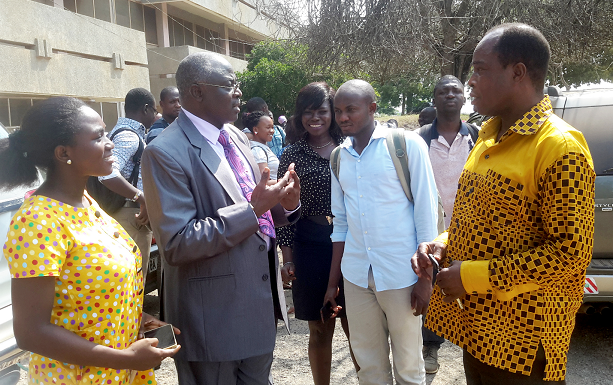
UCC outlines succession plan
The University of Cape Coast (UCC) has instituted a policy under which workers will receive regular training through workshops and seminars organised by the university.
Advertisement
The policy is part of a succession plan by the university to ensure that there is continuous progression and smooth takeover of responsibility.
Sharing his legacy with the Daily Graphic after interacting with MA students, the Vice-Chancellor of the university, Professor Domwini Dabire Kuupole, said, “this has led to a phenomenal increase of the number of professors and senior members of staff in the university.
“If you compare the number of professors we had when I took over in 2012 and now, there is a phenomenal increase in terms of promotion of professors and from senior level to professorial status and from staff to senior level status and in the analogous situation.”
Confucius Centre
Enumerating some of his achievements as he bows out of office, the Vice-Chacellor mentioned the institution of the Confucius Centre of China to facilitate the learning of other people’s cultures as one of the major achievements the university had made during his administration.
He announced that the centre, which had been located at the Language Centre of the university, would also serve as a centre for deeper understanding of the Ghanaian culture.
Prof Kuupole revealed that the Chinese Government had pumped in $150,000 to start the centre and was confident that it was a mark of a long lasting relationship between the university and the People’s Republic of China.
Collegiate system
The VC believed that his decision to introduce the college system in place of the Departments was one that was yielding tremendous results.
“We used to talk of faculties and departments, now we are talking about colleges. We are going to have four three-tier colleges and one two-tier college,” he announced, explaining that the collegiate system created an avenue to challenge staff to explore their potentials.
He said the system opened opportunities for staff to take initiatives and to innovate and develop their talents, citing for instance that a provost of a college was an academic and an administrative leader of the college that was tasked to take tough decisions without recourse to the Vice-Chacellor.
“He is also a fund raiser of the college and he has the responsibility and the duty to take initiative without having to seek permission from the Vice-Chancellor to undertake such responsibilities,” he explained.
Internally Generated Funds
Touching on self-sufficiency, Professor Kuupole listed other achievements under his watch to include the siting of a fuel station on campus, the installation of a sachet water producing plant, the sale of detergent produced by the university and a car washing bay under construction which is expected to be inaugurated in September this year.
He announced that the university had registered a limited liability company called the University of Cape Coast Enterprise Ltd to think through income generation plans.
Professor Kuupole explained that the intention of the university was to increase its internally generated funds (IGF) activities, adding that there were other income generating activities such as a meat processing unit, and carpentry and block making shops in the pipeline.
He announced that the university had paid for hundred-acres beyond Twifo Praso for commercial purposes and also to use part of it for the School of Agriculture.
“We intend to give part of it to someone who wants to do solar farming and the School of Agriculture can station some staff there to take care of the commercial farm as well as for research purposes,” Professor Kuupole added.
Witer’s Email: severious.dery@:graphic.com.gh



